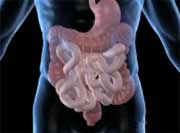Clinical nonresponders have significantly higher fecal concentrations of infliximab
WEDNESDAY, Aug. 5, 2015 (HealthDay News) — For patients with moderate to severely active ulcerative colitis (UC), clinical nonresponders to infliximab have high concentrations of infliximab in fecal samples, according to a study published in the August issue of Gastroenterology.
Johannan F. Brandse, M.D., from the Academic Medical Center in Amsterdam, and colleagues collected fecal samples from 30 patients with moderate to severely active UC during the first two weeks of infliximab therapy. The authors measured infliximab concentrations in serum and supernatants of fecal samples. At two and eight weeks and three months after treatment, clinical and endoscopic responses were assessed.
The researchers detected infliximab in 66 percent of the 195 fecal samples, with the highest concentrations seen in the first days after the initial infusion. Compared with responders, clinical nonresponders at week two had significantly higher fecal concentrations of infliximab after the first day of treatment (median concentration, 5.01 versus 0.54 µg/mL; P = 0.0047). No correlation was observed between fecal and serum concentrations of infliximab.
“Infliximab is lost into stools of patients with UC. High fecal concentrations of infliximab in the first days after therapy begins are associated with primary nonresponse,” the authors write. “Additional studies are needed to determine how therapeutic antibodies are lost through the intestinal mucosa and how this process affects treatment response.”
Several authors disclosed financial ties to the pharmaceutical industry.
Copyright © 2015 HealthDay. All rights reserved.








